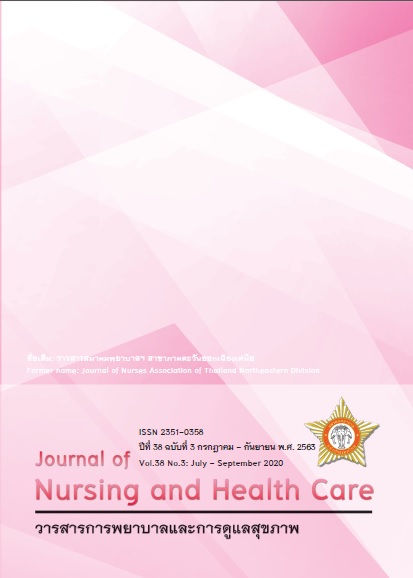การรับรู้ภาวะผู้นำการเปลี่ยนแปลงและการพัฒนาตนเองของพยาบาลพี่เลี้ยงที่ปฏิบัติงานในเครือโรงพยาบาลกรุงเทพเขตภาคตะวันออกเฉียงเหนือ
คำสำคัญ:
ภาวะผู้นำการเปลี่ยนแปลง การพัฒนาตนเอง พยาบาลพี่เลี้ยงบทคัดย่อ
การวิจัยเชิงบรรยายนี้มีวัตถุประสงค์เพื่อศึกษาระดับภาวะผู้นำการเปลี่ยนแปลงและศึกษาการพัฒนาตนเองของพยาบาลพี่เลี้ยงที่ปฏิบัติงานในเครือโรงพยาบาลกรุงเทพเขตภาคตะวันออกเฉียงเหนือ 4 แห่ง ได้แก่ โรงพยาบาลกรุงเทพอุดร โรงพยาบาลกรุงเทพขอนแก่น โรงพยาบาลกรุงเทพราชสีมา และโรงพยาบาลกรุงเทพปากช่อง โดยศึกษาในพยาบาลพี่เลี้ยงทุกคน จำนวน 95 คน เก็บข้อมูลโดยใช้แบบสอบถามที่ดัดแปลงจากแบบสอบถามภาวะผู้นำการเปลี่ยนแปลงของ นิภาวรรณ ยวงวิภักดิ์ และ มาริสา ไกรฤกษ์ (2561) ที่สร้างขึ้นตามแนวคิดของ Fullan (2002) และการสนทนากลุ่มเกี่ยวกับภาวะผู้นำการเปลี่ยนแปลงและการพัฒนาตนเองของพยาบาลพี่เลี้ยง วิเคราะห์ข้อมูลด้วยสถิติเชิงบรรยายและการวิเคราะห์เนื้อหา
ผลการวิจัยพบว่า ภาวะผู้นำการเปลี่ยนแปลงของพยาบาลพี่เลี้ยงโดยรวมอยู่ในระดับมาก (= 4.25, SD = 0.41) ด้านการมีเป้าหมายเชิงจริยธรรมอยู่ในระดับมากที่สุด (= 4.59, SD = 0.42) ด้านการเข้าใจกระบวนการเปลี่ยนแปลง ด้านการสร้างและพัฒนาความสัมพันธ์ ด้านการสร้างและการแบ่งปันความรู้ และด้านการสร้างความสามัคคีอยู่ในระดับมาก (= 4.37, 3.99, 4.00, และ 4.30 ตามลำดับ SD = 0.48, 0.46, 0.66, และ 0.53 ตามลำดับ) ข้อมูลจากการสนทนากลุ่มสนับสนุนว่าพยาบาลพี่เลี้ยงมีภาวะผู้นำการเปลี่ยนแปลงในทุกด้านและพัฒนาตนเองโดยการปรับวิธีคิดและทัศนคติต่อการเป็นพี่เลี้ยง พัฒนาบุคลิกภาพ สร้างแรงจูงใจให้ตนเอง เตรียมความพร้อมและพัฒนาความรู้ความสามารถในการเป็นพี่เลี้ยงและการสอน
Downloads
เอกสารอ้างอิง
2. Katewahuong R. The development of nurse residency program. Ph. D. in Social Sciences Journal 2013; 3(3): 53-67. (In Thai)
3. Nantsupawat A, Sngounsiritham U. Mentoring system and nursing professional development. Nursing Journal 2019; 46(3): 232-8. (In Thai)
4. Plodpluang, U. Competencies of preceptor. Princess of Naradhivas University Journal 2016; 8(3): 168-74. (In Thai)
5. Shinners JS, Franqueiro T. Preceptor skills and characteristics: considerations for preceptor education. The Journal of Continuing Education in Nursing 2015; 46(5): 233-36.
6. Zilembo M, Monterosso L. Nursing students’ perceptions of desirable leadership qualities in nurse preceptors: A descriptive survey. Contemporary Nurse 2008; 27(2): 194-206.
7. Pongboriboon U. Being the preceptor: The challenge of nurse’s self-efficacy. Journal of The Royal Thai Army Nurses 2018; 19: 22-30. (In Thai)
8. Prousoontorn M, Oumtanee A. Work experience of nurse mentorship in a governmental university hospital. Thai Journal of Nursing Council 2009; 24(3): 56-69. (In Thai)
9. Chen YH, Duh, YJ, Feng, YF, Huang, YP. Preceptors' experiences training new graduate nurses: A hermeneutic phenomenological approach. Journal of Nursing Research. 2011; 19(2): 132-140 doi: 10.1097/JNR.0b013e31821aa155
10. Valizadeh S, Borimnejad L, Rahmani A, Gholizadeh L, Shahbazi S. Challenges of the preceptors working with new nurses: A phenomenological research study. Nurse Education Today. 2016 Sep 1;44:92-7.
11. Triprakong S, Saensabai C, Sanghean U. Effect of implementing the mentor nurse system on the role and satisfaction of mentor nurses in the Department of Nursing. Songklanagarind Hospital 2008; 26(2): 163-173. (In Thai)
12. Louhasuwanpanich S, Namthep J Simpattananont K. Analysis & evaluation of preceptor training program in nursing department Siriraj Hospital. Siriraj Nursing Journal 2007; 1(1): 37-49. (In Thai)
13. Tiangjaroen P. The effect of using nurse mentorship pattern on new professional nurses’ nursing team leader performance, Chachoengsao Hospital, Chachoengsao province. Master of Nursing Science Thesis, Graduate Study, Burapha University 2012. (In Thai)
14. Fullan M. The change leader. Educational leadership 2002 May; 59(8): 16-21.
15. Youngwipack N, Krairiksh, M. Factors influencing transformational nursing leadership of head nurses in hospitals under Provincial Royal Thai Army. Research and Development health System Journal 2018; 11(1): 501-512. (in Thai)
16. Bally JM. The role of nursing leadership in creating a mentoring culture in acute care environments. Nursing Economics 2007; 25(3): 143-149.
17. Beauchamp MR, Scarlett LJ, Ruissen GR, Connelly CE, McBride CB, Casemore S, Martin Ginis KA. Peer mentoring of adults with spinal cord injury: A transformational leadership perspective. Disability and rehabilitation 2016; 38(19): 1884-1892.
18. Dube A, Jooste K. The leadership characteristics of the preceptor in selected clinical practice settings in Botswana. Curationis 2006; 29(3): 24-40.
19. Panzavecchia L, Pearce R. Are preceptors adequately prepared for their role in supporting newly qualified staff?. Nurse education today 2014; 34(7): 1119-1124.
20. Prousoontorn M, Oumtanee A. Work experience of nurse mentorship in governmental university hospital. Thai Journal of Nursing Council 2009; 24(3): 56-69. (In Thai)
21. Pulperm P, Tehopakarn N, Maneewat T. Self empowerment program development for nursing supervisors, Suratthani Hospital. Journal of Nurses’ Association of Thailand, North-eastern Division 2012; 30(3): 95-103. (In Thai)
22. Wongsaree C, Sirilukkananan K. Ph.D. Instructional design and achievement test construction in 21st century in theoretical subjects in the field of nursing education. Journal of Health and Health Management 2019; 5(2): 1-22. (In Thai)
23. Cheuaiam S, Triudomsri S, Chaiyawut P. Effects of practical teaching with reflection on clinical skilled nursing and satisfaction in nursing for principles and techniques in nursing. Udonthani Hospital Medical Journal 2019; 27(2): 150-157. (In Thai)



